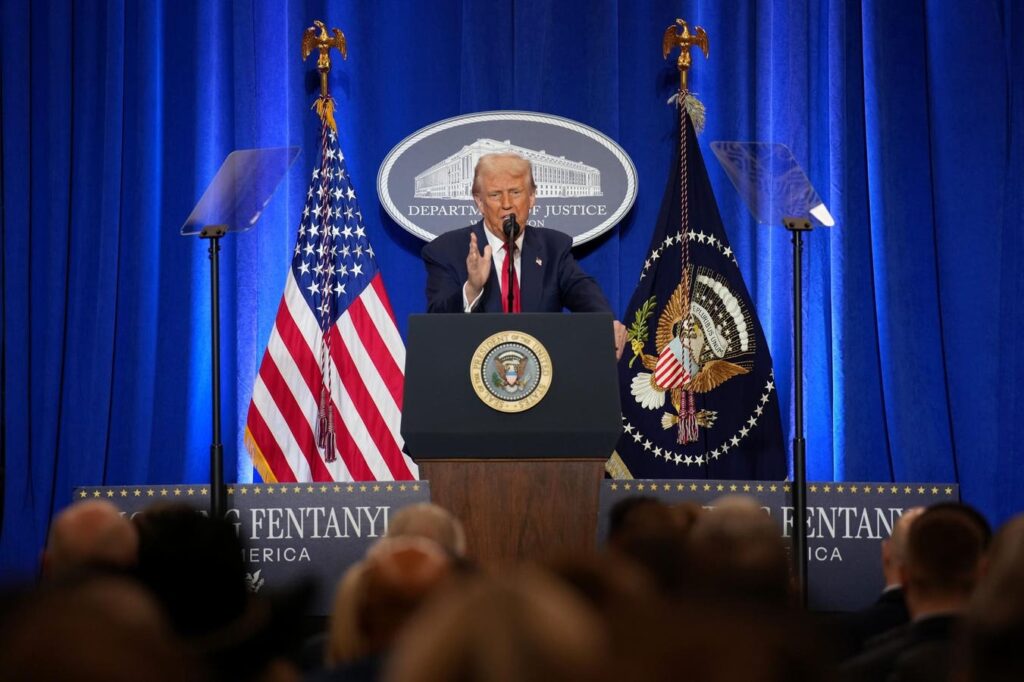WASHINGTON, DC – MARCH 14: U.S. President Donald Trump speaks at the Justice Department March 14, … More
Getty ImagesMatthew R. Galeotti, the Head of the Criminal Division at the Justice Department has issued a memorandum describing the Justice Department’s new policies and enforcement priorities in dealing with collar crime. In describing its areas of focus, the memorandum states “The Criminal Division must be laser-focused on the most urgent criminal threats to the country. Therefore consistent with the enforcement policies and priorities of this Administration, the Criminal Division will prioritize investigating and prosecuting corporate crime in areas that will have the greatest impact in protecting American Citizens and companies and promoting U.S. interests.”
The memorandum lists the following ten areas of white collar crime which the Justice Department is prioritizing:
- Health care fraud;
- Trade fraud;
- Fraud perpetrated through Variable Interest Entities which the Justice Department describe as Chinese affiliated companies that carry significant risks to American investors;
- Investment fraud such as Ponzi schemes;
- Conduct that threatens national security including money laundering by banks on behalf of cartels and terrorist organizations;
- Corporations supporting terrorists;
- Money laundering;
- Violations of drug laws;
- Bribery;
- Cryptocurrency crimes affecting investors.
The inclusion of bribery in the list of priorities is noteworthy in the light of President Trump’s executive order suspending enforcement of the Foreign Corrupt Practices Act on the basis of it allegedly harming American business competitiveness in international business. The Foreign Corrupt Practices Act criminalizes bribery of foreign officials by American companies. Nor is it reflected in the order to the Manhattan US Attorney to dismiss the bribery charges against NY major Eric Adams that resulted in the resignation of US Attorney Danielle Sassoon who chose to resign rather than follow such an order.
Notably missing from the list of priorities is prosecution of income tax fraud. This is particularly noteworthy in the light of a 2021 Treasury report that estimated that the top 1% of earners account for over $160 billion dollars in unpaid taxes annually. However, this is not surprising on the heels of DOGE plans to cut up to 25% of the IRS staff including draconian cuts to the IRS’ Criminal Investigations unit which plays an essential role in combating drug and human trafficking, terrorism, tax crimes, financial crimes and money laundering.
Also totally missing from the list of priorities is the prosecution of environmental crimes although the global impact of environmental crimes has been estimated by the Financial Action Task Force, a global organization that sets international standards to fight money laundering and terrorist financing to be as high as $281 billion not to mention the cost to society in the destruction of the environment, contamination of naturl resources and public health dangers.
In a clear indication of the new goals of the Justice Department, the memorandum states that prosecutors “must avoid overreach that punishes risk-taking and hinders innovation.” It goes on to say that the Justice Department “must strike an appropriate balance between the need to effectively identify, investigate, and prosecute corporate and individuals’ criminal wrongdoing while minimizing unnecessary burdens on American enterprise.”
The famous 2015 memorandum of Deputy Attorney General Sally Yates entitled “Individual Accountability for Corporate Wrongdoing” which was prompted by criticism of the Justice Department’s failure to effectively prosecute individuals in response to the 2008 financial meltdown stressed the intention to prioritize prosecution of individuals for corporate wrongdoing rather than just the corporations themselves. Despite the good intentions to prosecute individuals and thereby provide a true disincentive for white collar criminals to avoid committing such crimes, there was little change in the numbers of individuals prosecuted as compared to actions against corporations which cannot be jailed. For example, 75% of the prosecutions under the Foreign Corrupt Practices Act ( the law President Trump is presently suspending enforcement of) in the six years prior to the Yates memorandum were against companies rather than individuals within the companies and from 2015 to 2024 the number of prosecutions against companies rather than their employees or officers remained the same.
Similar to the Yates memorandum, the Galeotti memorandum also states that the Justice Department’s “first priority is to prosecute individual criminals. It is individuals – whether executive, officers or employees of companies – who commit these crimes, often at the expense of shareholders, workers, and American investors and consumers. The Criminal Division will investigate these individual wrongdoers relentlessly to hold them accountable.” The words are laudable as they were in the Yates memo. Whether they will turn into action is another matter.
The Galeotti memorandum concludes by saying “Focused, fair, and efficient white-collar enforcement promotes American economic and national security interests while protecting American taxpayers, investors, consumers, and businesses. Results of the Criminal Division’s efforts in this regard will be measured by the practical benefits brought to bear for all relevant parties, not symbolic resolutions against shell entities or running up the scoreboard. We will foster cooperative relationships with those in industry that align with the Department in this pursuit, and we will root out the criminal element that works against these goals. As in everything we do, we will do so with integrity and in the interests of justice.”
Actions, however, speak louder than words. On the same day that the Galeotti Memorandum was issued, the FBI, the primary criminal investigative arm of the Justice Department, instructed its agents to target their efforts on immigration enforcement and less time on white collar crime enforcement.
Read the full article here


